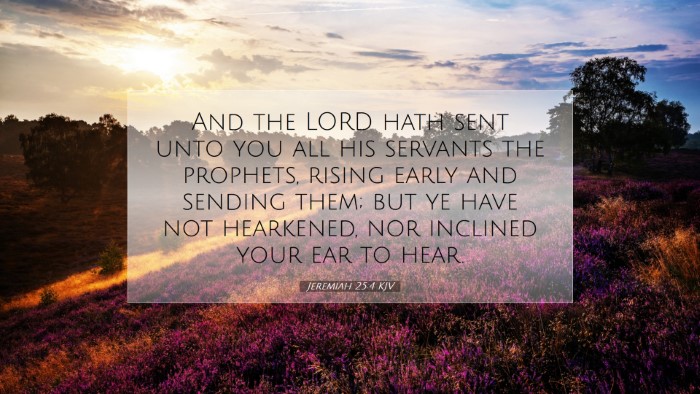Commentary on Jeremiah 25:4
Jeremiah 25:4 states: "And the Lord has sent unto you all his servants the prophets, rising early and sending them; but ye have not hearkened, nor inclined your ear to hear." This verse encapsulates the essence of God's persistent communication with His people through the prophets, highlighting their refusal to heed divine warnings. The following summary aims to extract insights from esteemed public domain commentaries to shed light on this profound scripture.
The Theme of Divine Communication
Matthew Henry emphasizes the role of God's prophets as His representatives on earth, through whom He conveys His will. God’s sending of prophets is a testament to His grace and mercy, indicating a desire for reconciliation rather than judgment. This speaks volumes about God's character, as He consistently seeks to lead His people back to righteousness.
- Persistent Appeal: God’s act of “rising early” metaphorically suggests His eagerness and relentless pursuit of His people’s attention. The phrase denotes not just the frequency of these communications but underscores God’s infinite patience and enduring love.
- Prophetic Voices: Albert Barnes notes that the multitude of prophets indicates the seriousness of the situation. Each prophet represents a distinct message or a facet of God's law, which should not be overlooked. The sheer number of voices should have prompted reflection and repentance, highlighting the consequences of willful ignorance.
Human Response to Divine Messages
Despite God’s earnest attempts to guide them, the text starkly reveals the obstinacy of His people. As Adam Clarke elucidates, the rejection of prophetic counsel symbolizes a broader unwillingness to acknowledge their sinful state and need for divine intervention. This persistent disregard for the warnings reflects a condition of spiritual blindness that can lead to dire consequences.
- Disregard for God’s Counsel: The phrase "ye have not hearkened" indicates a deliberate choice to ignore the admonishments. This rebellion is an indictment against their spiritual apathy and moral corruption.
- Inclining the Ear: The command to “incline your ear” signifies the need for active listening, not just passive hearsay. This is a call to engage with the message of God, to reflect and act upon it, which they failed to do.
Implications for Leadership and Ministry
For pastors and spiritual leaders, Jeremiah 25:4 serves as a sobering reminder of the importance of faithfulness in delivering God’s messages. The commitment of the prophets to speak out against sin amidst ridicule and rejection presents a model for contemporary ministry:
- Faithfulness Over Popularity: Leaders are called to prioritize truth over acceptance. The prophets often faced opposition, yet remained steadfast. This encourages modern ministers to uphold their calling despite societal pressures.
- Testimony of Grace: The persistence of God's outreach, even amidst rejection, points to the unyielding nature of divine love. Pastors should embody this grace, offering restoration and hope to those who have strayed.
Theological Reflections
The rejection of God's prophets has profound theological implications. Barnes discusses the tragic cycle of sin and repentance found throughout Israel's history. The habitual rejection of prophetic voices often led to increased judgment—a pattern that continues to resonate with contemporary faith communities.
- Judgment and Mercy: The balance of God's judgment and mercy is vital. Each prophetic warning had a purpose—to call His people back and avert destruction. God’s actions reflect His dual nature as Just and Merciful.
- Application to Contemporary Believers: Those who encounter God’s message today through preaching or personal study must recognize the importance of responsiveness to the Holy Spirit. Failure to heed His voice may lead to spiritual decline.
Conclusion
Jeremiah 25:4 stands as a clarion call for sincerity in our relationship with God. Through the lens of public domain commentaries, it is evident that God’s fervent calling through prophets remains relevant in guiding His people toward righteousness. For pastors, students, theologians, and scholars, this verse serves as both a cautionary tale against the apathy of the human heart and an invitation to embrace the divine wisdom that seeks to illuminate our paths.


